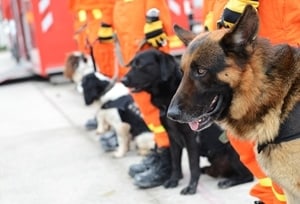 Professionals in the industry of veterinary technology know that dogs have individual personalities, but a new study suggests that dogs are in fact capable of being pessimists. The research, conducted by scientists at the University of Sydney, used an incentivized test to determine if dogs had an optimistic disposition or a more pessimistic view. Though it’s rather challenging to determine the personality of a pup, this research highlights that each dog may have more of a persona than most people realize. The experiment was published in PLOS One under the title, “Canine Sense and Sensibility: Tipping Points and Response Latency Variability as an Optimism Index in a Canine Judgement Bias Assessment.”
Professionals in the industry of veterinary technology know that dogs have individual personalities, but a new study suggests that dogs are in fact capable of being pessimists. The research, conducted by scientists at the University of Sydney, used an incentivized test to determine if dogs had an optimistic disposition or a more pessimistic view. Though it’s rather challenging to determine the personality of a pup, this research highlights that each dog may have more of a persona than most people realize. The experiment was published in PLOS One under the title, “Canine Sense and Sensibility: Tipping Points and Response Latency Variability as an Optimism Index in a Canine Judgement Bias Assessment.”
How scientists determined if a dog is an optimist or pessimist
To distinguish whether or not dogs had differing perspectives, researchers used a sample group of 40 canines of different sizes and ages.1 While that may not seem like many dogs, most studies only consist of around 10 dogs, making this a relatively extensive sample.2 To begin, scientists first presented dogs with an apparatus that contained two targets. When a dog pushed on one of the targets, lactose-free milk was presented as a reward. If a dog pressed the other target, water was presented instead. The apparatus used an infrared sensor as the trigger, which detected movement from the participating canines.1 The volume of the milk and water was set to provide each dog with the same reward for each test and varied in accordance with the dog’s weight. The dogs were trained to touch a certain target after hearing two distinct tones that were two octaves apart. One tone coincided with the dog receiving milk, while the other meant the dog would receive water. The dogs eventually became trained to recognize the tone that would provide them with milk – the reward. After the dogs had gained understanding of which target to hit in relation to each tone, researchers began playing ambiguous tones for the dogs, different from either of the tones they’d previously heard. Dogs reacted differently when exposed to these ambiguous tones. Whereas some dogs continued to hit the target in hopes of receiving a reward, other dogs quickly gave up or became distressed when no milk was given. This lead scientists to the conclusion that such an apparatus could be used identify cognitive biases within dogs in order to help train them.1 Furthermore, scientists believe that dogs continuing to hit the target in hope of reward demonstrates an inherent level of optimism. On the other hand, dogs that gave up were said to exhibit pessimism.
What this means for vets
Dr. Melissa Starling, a member of the Faculty of Veterinary Medicine at the University of Sydney and an author of the study explains, “This research could help working dog trainers select dogs best suited to working roles. If we knew how optimistic or pessimistic the best candidates for a working role are, we could test dogs’ optimism early and identify good candidates for training for that role. A pessimistic dog that avoids risks would be better as a guide dog while an optimistic, persistent dog would be more suited to detecting drugs or explosives.”2 Veterinary practices and animal shelters are potential places for such research to be done. Identifying dogs for various working roles could be beneficial for vets, animal trainers and pedestrians in need. Moreover, these findings suggest that it’s possible for pet owners to train their dogs to develop a certain type of personality. Also, this study demonstrates the positive roles that can be held by dogs with both optimistic and pessimistic dispositions. 1 “Canine Sense and Sensibility: Tipping Points and Response Latency Variability as an Optimism Index in a Canine Judgement Bias Assessment” by Melissa J. Starling, Nicholas Branson, Denis Cody, Timothy R. Starling, Paul D. McGreevy. PLOS One. September 17, 2014. http://www.plosone.org/article/info%3Adoi%2F10.1371%2Fjournal.pone.0107794 2 “Dogs can be pessimists too” University of Sydney. September 17, 2014. http://sydney.edu.au/news/84.html?newsstoryid=14058



